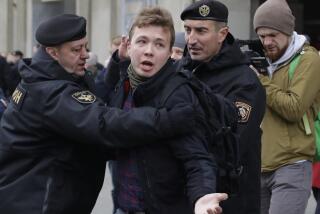Teen Pilot Says He’s ‘Sorry’ for Moscow Flight
- Share via
MOSCOW — West German teen-ager Mathias Rust apologized to a Soviet court today for flying a single-engine plane into Red Square. He said it started as a mission of peace but ended as the greatest mistake of his life.
“My flight was not the best action to bring this about. I’m very sorry,” Rust, a 19-year-old resident of suburban Hamburg, said during nearly five hours of testimony on the first day of trial at the Soviet Supreme Court.
It was his first public appearance since he piloted a Cessna 172B across the Soviet border on May 28 and set it down amid hundreds of astonished pedestrians on Red Square near the Kremlin, the seat of Soviet power. The flight led to a shake-up of the Soviet military establishment.
Rust faces charges of hooliganism, illegally crossing the Soviet border and violating international flight rules, and he could get 10 years in prison. The trial is expected to last three days.
Rust today called himself “a very sentimental man” who meant no harm to anyone.
He said he wanted to meet with Soviet leader Mikhail S. Gorbachev to discuss a new political system that would bring east and west together in “full democracy, democracy in the fullest sense of the word.”
“I sought the source of peace, and the source of peace is not in Washington, but in Moscow,” Rust said. Pale but poised, he spoke in a firm, clear voice and did not appear to be intimidated.
Mother Testifies
The youth’s mother, Monika, also testified in his behalf, saying he wished only for world peace.
Her testimony and Rust’s portrayed the tall, thin pilot as a loner who was worried about international relations but who never took part in the West German peace movement.
Supreme Court Judge Robert Tikhomirnov and prosecutor Vladimir Andreyev repeatedly reminded Rust that he could have killed or injured many people by landing on crowded Red Square.
Rust first told Tikhomirnov after the charges were read that “I am aware of my guilt” but later he said he did not acknowledge guilt on the charge of malicious hooliganism because he had no intention of hurting anyone.
“My flight did not have any aggressive intentions,” he said.
Under questioning from Andreyev and his Soviet lawyer, Vsevolod Yakovlev, Rust told the court that with the perspective of the last 14 weeks in Lefortovo Prison, he realizes that his approach was wrong.
“I threatened the lives of people. That’s my opinion today. I will never repeat it,” he said. “It’s the greatest mistake I’ve made in my life.”
More to Read
Sign up for Essential California
The most important California stories and recommendations in your inbox every morning.
You may occasionally receive promotional content from the Los Angeles Times.












